Innate Immunity Research Group
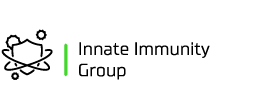
Our research group focuses on the role of innate lymphoid cells (ILCs) in the tumor microenvironment. These cells are a critical component of the immune system, serving as a defense against bacterial, viral, fungal, and parasitic infections. Additionally, ILCs are involved in lymphoid tissue formation, underscoring their importance in maintaining immune system stability. Innate lymphoid cells are particularly abundant in the body’s barrier tissues, such as the skin, lungs, and gastrointestinal tract, where they play a key role in pathogen response and maintaining organismal homeostasis.
ILCs are divided into five main subtypes: NK cells, ILC1, ILC2, ILC3, and lymphoid tissue inducer cells (LTi). Each of these groups plays a unique role in the immune response and is activated through different mechanisms. From a cancer perspective, ILC2 cells are of particular interest due to their significant activity within the tumor microenvironment. Our research focuses on melanoma, one of the most aggressive skin cancers. Over the past three decades, melanoma has shown a concerning increase in incidence, making it a focal point in the search for new therapeutic methods. Despite advances in treatment, conventional therapies are not always sufficient, particularly in advanced or treatment-resistant cases.
Understanding the role of ILC2 cells in the tumor microenvironment is a key aspect of our research. ILC2 cells have the ability to secrete cytokines such as IL-4, IL-5, and IL-13, which can influence other immune cells as well as stromal cells within the tumor. Depending on the microenvironmental conditions, ILC2 cells can support antitumor responses by activating immune mechanisms or, in certain situations, contribute to tumor progression through immunosuppression.
Our research employs an interdisciplinary approach, incorporating molecular techniques such as flow cytometry, along with in vitro and in vivo models, to understand the interactions between ILC2 cells and other components of the tumor microenvironment. We also aim to identify biomarkers that can aid in diagnosing various cancer stages and predicting responses to different therapies. In the long term, our studies aim to develop innovative therapeutic strategies that could modify ILC2 functions, restoring balance in the tumor microenvironment to favor antitumor responses. Additionally, we are exploring the potential application of these cells in immunotherapy, particularly for treating patients with melanoma resistant to traditional treatment methods.
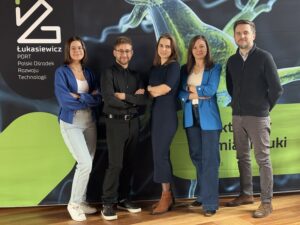
Cancer is a global public health threat. Tumor development often occurs in barrier tissues, such as the skin, lungs, and gastrointestinal tract, which play a critical role in protecting the body against pathogens. These tissues are home to innate lymphoid cells (ILCs), which, despite lacking the classical antigen receptors characteristic of T and B lymphocytes, play a key role in the body’s immune defense. Among the major ILC subtypes, ILC2 is particularly intriguing in the context of skin cancers, especially melanoma.
ILC2 cells secrete a range of cytokines, including IL-4, IL-5, and IL-13, which are pivotal in regulating immune responses. These cytokines modulate inflammatory responses and influence the activity of other cells, such as eosinophils, which are involved in eliminating tumor cells. Studies suggest that ILC2 cells can play a dual role in the tumor microenvironment: on one hand, they support antitumor responses, while on the other, they may promote tumor progression by contributing to immunosuppression (Wagner et al., Trends Cancer, 2017). Understanding these complex mechanisms is essential for developing new therapeutic strategies.
Our research focuses on understanding how ILC2 cells interact with tumor cells in the tumor microenvironment, particularly in the context of melanoma. We have demonstrated that ILC2 cells can recruit eosinophils, which subsequently participate in the elimination of tumor cells. However, the tumor microenvironment, through mechanisms such as the secretion of metabolic products, can inhibit ILC2 activity, leading to tumor progression (Wagner and Koyasu, Trends Immunol, 2019; Wagner et al., Cell Rep, 2020). This highlights the need for further investigation into the interactions of ILC2 cells with other components of the tumor microenvironment to understand how these interactions change in response to tumor-derived signals.
From a therapeutic perspective, ILC2 cells represent a promising target in cancer treatment, particularly melanoma (Wagner and Koyasu, Trends Cancer, 2022). The use of genetically modified ILC2 cells in adoptive therapy could restore their ability to produce antitumor cytokines, potentially resulting in a stronger immune response. Techniques such as gene editing could enhance the function of ILC2 cells, enabling them to combat tumor cells more effectively, even in the presence of immunosuppressive mechanisms within the tumor microenvironment. Research into the application of ILC2 cells in cancer immunotherapy is increasingly promising and may lead to breakthroughs in the treatment of skin cancers.
Additionally, identifying novel biomarkers to monitor ILC2 activity within the tumor microenvironment could be a crucial step toward developing personalized therapies that more effectively address the unique characteristics of individual tumors. In the context of melanoma, which is characterized by high biological variability, understanding the mechanisms influencing ILC2 activity and their interactions with other cells in the tumor microenvironment could contribute to the development of more effective immunotherapies that alter the dynamics of tumor progression.
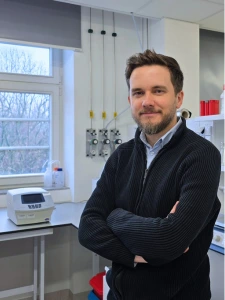
Marek Wagner received his PhD in cancer research from the University of Bergen (Bergen, Norway) with part of his research performed at Harvard Medical School & Children’s Hospital Boston (Boston, USA) as a member of the Vascular Biology Program established by Dr. Judah Folkman. For his doctoral studies, he focused on the tumor microenvironment and made a seminal discovery by identifying an angiogenic potential of tumor-associated adipose tissue (Wagner et al., Angiogenesis 2012). During his postdoctoral training at the University of Bergen (Bergen, Norway), he found that the establishment of the tumor inflammatory microenvironment depends on the presence of functional lymphatic vessels (Lund and Wagner et al., JCI 2016). He also joined RIKEN (Yokohama, Japan) and worked in the laboratory headed by Dr. Shigeo Koyasu who identified a subset of innate lymphocytes, which produce type 2 cytokines and are now called group 2 innate lymphoid cells (ILC2s). Together with Dr. Koyasu, he contributed to the development of a new field of immunology by carrying out studies to assess the role of ILC2s in the tumor growth and progression (Wagner et al., Cell Reports 2020). From January 2023, Marek is leading the Innate Immunity Research Group at Łukasiewicz – PORT (Wrocław, Poland).If you are interested in joining our group, contact us at:
marek.wagner@port.lukasiewicz.gov.pl
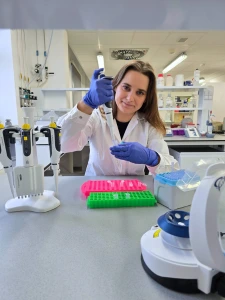
Martyna earned her PhD degree in cancer immunology at the Ludwik Hirszfeld Institute of Immunology and Experimental Therapy PAS. Her research focused on investigating the role of tumor-associated macrophages (TAMs) in breast cancer within the context of vitamin D influence on the tumor microenvironment. During her study, she characterized TAMs in the context of metastatic phenotype and explored the ability of monocytes and bone marrow progenitors to polarize towards pro- or anticancer macrophages, all correlated with the vitamin D status and stage of the disease in mice/patients. She also completed a short-term internship at the State University of New York during her academic journey. In our team, as a post-doc, she is dedicated to identifying novel activators of ILC2s in melanoma, continuing her research interests related to vitamin D.
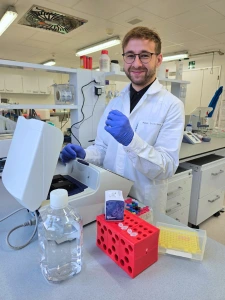
Mateusz holds an MSc degree in Biotechnology from the Wrocław University of Science and Technology. His expertise lies at the intersection of molecular biology, microbiology and pharmacy. He also holds postgraduate qualifications in Quality Management. Throughout his career, he has served as a microbiologist in both manufacturing and service sectors. Initially joining our team as a laboratory manager, he is currently pursuing doctoral studies at the Medical University of Wrocław with a focus on cancer immunology. In the course of his research, he aims to dissect the interplay between innate immune cells and stromal cells within the tumor microenvironment of melanoma.
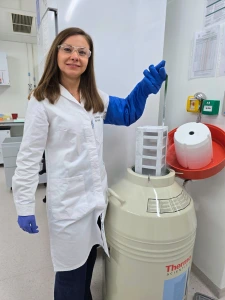
Natalia holds a master’s degree in Biotechnology, with a specialisation in Molecular Microbiology from the University of Wroclaw. She gained her experience working in diagnostic and research laboratories, including Łukasiewicz Research Network – PORT, where she contributed to critical projects during the SARS-CoV-2 pandemic and managed research project coordination in a BSL-3 Laboratory. Her expertise includes advanced laboratory techniques such as nucleic acid isolation, PCR, and NGS sequencing. In our team, Natalia serves as Laboratory Manager, overseeing both scientific and operational aspects of the lab’s activities. Her responsibilities include budget control, purchase order management, documentation handling, and ensuring the efficient organisation of the laboratory.
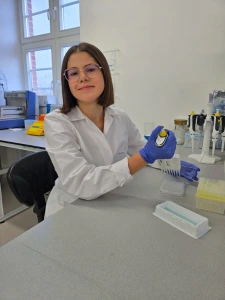
Kasia graduated in medical biotechnology from the University of Wroclaw. During her studies, she conducted research on the mechanisms of heme uptake by bacteria of the Bacteroidota phylum. She conducted her master’s thesis at the Department of Biotechnology at the University of Wroclaw and at the Institute of Molecular Biology in Barcelona. She has completed internships in the laboratories of pharmaceutical companies Polfa Rzeszow and mibe GmbH (Germany), as well as in diagnostic laboratories. In our team she serves as a technician. She is responsible for preparing the laboratory workplace and supporting researchers in their experimental work.
2025
- Reinventing type 2 immunity in cancer. Marek Wagner, Hiroyoshi Nishikawa, Shigeo Koyasu, Nature, 2025 Jan; 637 (8045): 296-303. DOI: 10.1038/s41586-024-08194-2, PMID: 39780006
2024
- Distinguishable topology of the task-evoked functional genome networks in HIV-1 reservoirs. Wiśniewski J, Więcek K, Ali H, Pyrc K, Kula-Păcurar A, Wagner M, Chen HC.iScience. 2024 Oct 21;27(11):111222. doi: 10.1016/j.isci.2024.111222. eCollection 2024 Nov 15.PMID: 39559761
- Contribution of initial lymphatics to oral wound healing after tooth extraction. Virtej A, Marti L, Wagner M, Wiig H, Xue Y, Bletsa A, Berggreen E.Eur J Oral Sci. 2024 Aug;132(4):e13006. doi: 10.1111/eos.13006. Epub 2024 Jul 11.PMID: 38989803
2023
- Innate lymphoid cells and tumor-derived lactic acid: novel contenders in an enduring game.
Marciniak M, Wagner M. Front Immunol. PMID: 37868977 - Isolation of lymph shows dysregulation of STAT3 and CREB pathways in the spleen and liver during leukemia development in a rat model. Eli Sihn Samdal Steinskog, Kenneth Finne, Marek Wagner, Marianne Enger, Lars Helgeland, Per Ole Iversen, Emmet McCormack, Helge Wiig, Olav Tenstad. https://doi.org/10.1111/micc.12800
2022
- Cancer immunosurveillance by ILC2s.
Wagner M, Koyasu S. Trends Cancer. PMID: 35871054 - ILC2s and Adipose Tissue Homeostasis: Progress to Date and the Road Ahead.
Misawa T, Wagner M, Koyasu S. Front Immunol. PMID: 35784368
2021
- Pharmacokinetics and Pharmacodynamics of T-Cell Bispecifics in the Tumour Interstitial Fluid.
Eigenmann MJ, Karlsen TV, Wagner M, Tenstad O, Weinzierl T, Fauti T, Grimm HP, Skogstrand T, Klein C, Sam J, Umana P, Bacac M, Wiig H, Walz AC. 2021. PMID: 34959386 - Innate Lymphoid Cells in Skin Homeostasis and Malignancy.
Wagner M, Koyasu S. Front Immunol. PMID: 34691082
2020
- A 3D Skin Melanoma Spheroid-Based Model to Assess Tumor-Immune Cell Interactions.
Wagner M, Koyasu S. Bio Protoc. PMID: 33659488 - Tumor-Derived Lactic Acid Contributes to the Paucity of Intratumoral ILC2s.
Wagner M, Ealey KN, Tetsu H, Kiniwa T, Motomura Y, Moro K, Koyasu S. Cell Rep. PMID: 32101749
2019
- Blockade of Lymphangiogenesis Shapes Tumor-Promoting Adipose Tissue Inflammation.
Wagner M, Steinskog ES, Wiig H. Am J Pathol. PMID: 31369756 - Cancer Immunoediting by Innate Lymphoid Cells.
Wagner M, Koyasu S. Trends Immunol. PMID: 30992189 - Hide and seek: Plasticity of innate lymphoid cells in cancer.
Bald T, Wagner M, Gao Y, Koyasu S, Smyth MJ. Semin Immunol. PMID: 30979591
2017
- Lymphangiogenesis Facilitates Initial Lymph Formation and Enhances the Dendritic Cell Mobilizing Chemokine CCL21 Without Affecting Migration.
Karlsen TV, Reikvam T, Tofteberg A, Nikpey E, Skogstrand T, Wagner M, Tenstad O, Wiig H. Arterioscler Thromb Vasc Biol. PMID: 28935759 - Plastic Heterogeneity of Innate Lymphoid Cells in Cancer.
Wagner M, Moro K, Koyasu S. Trends Cancer. PMID: 28718410
2016
- Lymphatic vessels regulate immune microenvironments in human and murine melanoma.
Lund AW*, Wagner M*, Fankhauser M, Steinskog ES, Broggi MA, Spranger S, Gajewski TF, Alitalo K, Eikesdal HP, Wiig H, Swartz MA. J Clin Invest. PMID: 27525437 - Impaired lymphatic function accelerates cancer growth.
Steinskog ES, Sagstad SJ, Wagner M, Karlsen TV, Yang N, Markhus CE, Yndestad S, Wiig H, Eikesdal HP. 2016. PMID: 27329584
2015
- Intercellular transfer of transferrin receptor by a contact-, Rab8-dependent mechanism involving tunneling nanotubes.
Burtey A, Wagner M, Hodneland E, Skaftnesmo KO, Schoelermann J, Mondragon IR, Espedal H, Golebiewska A, Niclou SP, Bjerkvig R, Kögel T, Gerdes HH. FASEB J. PMID: 26220176 - Tumor Interstitial Fluid Formation, Characterization, and Clinical Implications.
Wagner M, Wiig H. Front Oncol. PMID: 26075182 - Adipose tissue macrophages: the inflammatory link between obesity and cancer?
Wagner M, Samdal Steinskog ES, Wiig H. Expert Opin Ther Targets. PMID: 25474374
2014
- A dangerous duo in adipose tissue: high-mobility group box 1 protein and macrophages.
Wagner M. Yale J Biol Med. PMID: 24910558
2013
- Tumor versus stromal cells in culture–survival of the fittest?
Talasila KM, Brekka N, Mangseth K, Stieber D, Evensen L, Rosland GV, Torsvik A, Wagner M, Niclou SP, Mahesparan R, Vintermyr OK, Bjerkvig R, Nigro JM, Miletic H. PLoS One. PMID: 24349039 - Loss of adipocyte specification and necrosis augment tumor-associated inflammation.
Wagner M, Bjerkvig R, Wiig H, Dudley AC. 2013. PMID: 23991365 - A three-party alliance in solid tumors: Adipocytes, macrophages and vascular endothelial cells.
Wagner M, Dudley AC. 2013. PMID: 23805401 - Increased interstitial protein because of impaired lymph drainage does not induce fibrosis and inflammation in lymphedema.
Markhus CE, Karlsen TV, Wagner M, Svendsen ØS, Tenstad O, Alitalo K, Wiig H. Arterioscler Thromb Vasc Biol. PMID: 23288156
2012
- Tumor vasculature: the Achilles’ heel of cancer?
Johannessen TC, Wagner M, Straume O, Bjerkvig R, Eikesdal HP. Expert Opin Ther Targets. 2013 Jan;17(1):7-20. doi: 10.1517/14728222.2013.730522. Epub 2012 Nov 2.PMID: 23121690 - Vasostatin increases oxygenation of B16-F10 melanoma tumors and raises therapeutic efficacy of cyclophosphamide.
Cichoń T, Jarosz M, Smolarczyk R, Ogórek B, Matuszczak S, Wagner M, Mitrus I, Sochanik A, Jazowiecka-Rakus J, Szala S. Acta Biochim Pol. PMID: 22946026 - Inflamed tumor-associated adipose tissue is a depot for macrophages that stimulate tumor growth and angiogenesis.
Wagner M, Bjerkvig R, Wiig H, Melero-Martin JM, Lin RZ, Klagsbrun M, Dudley AC. 2012. PMID: 22614697
2009
- Lysosomal ceramide mediates gemcitabine-induced death of glioma cells.
Dumitru CA, Sandalcioglu IE, Wagner M, Weller M, Gulbins E. J Mol Med (Berl). PMID: 19763526
We are grateful to the following agencies for their generous support of our work.
![]()
If you are interested in joining our team, contact us at: marek.wagner@port.lukasiewicz.gov.pl
We are located at:
Łukasiewicz Research Network –
PORT Polish Center for Technology Development,
Life Sciences and Biotechnology Center,
Innate Immunity Research Group,
Stabłowicka 147, 54-066 Wrocław, Poland

